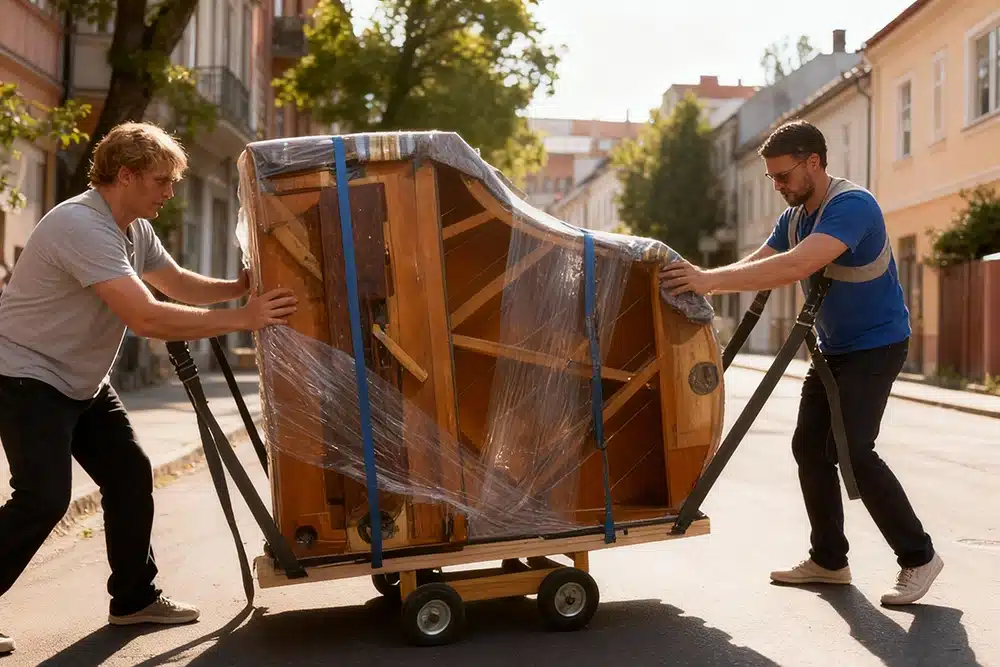When relocating a piano, the spread of misinformation can often lead to costly mistakes and damage to one of your most cherished possessions. As experts in piano moving, we are here to clarify the truth and dispel myths about the process. Pianos are not only massive in size but also delicate in structure, which requires specific knowledge and skills for safe transportation. Unfortunately, many piano owners are swayed by myths that seem logical but have no basis in reality, potentially leading to unfortunate outcomes.
Our experience has shown that understanding the real facts about piano moving can significantly reduce risks and stress during the relocation. In this discussion, we aim to address and debunk some of the most common myths surrounding this task. These myths often underestimate the complexity of moving such a specialized item and overlook the necessity of professional expertise. By the end of this, you’ll have a clearer insight into why certain professional practices are essential for moving pianos and how we can ensure the safety and integrity of your instrument throughout the relocation process.
Myth #1: Any Mover Can Handle a Piano
Many people believe that any mover can handle a piano, but this is a common misconception. Pianos are not just heavy objects; they are intricately designed instruments that need special care during relocation. Our company specializes in moving pianos and understands the nuances and requirements that general movers might not be aware of. Each piano has unique attributes, whether it’s a grand, upright, or electronic piano, and each requires a specific method of handling to prevent damage.
Our movers are trained extensively on the proper techniques needed to move different types of pianos effectively and safely. We equip them with the right tools and knowledge to approach each piano move precisely. This includes everything from the initial assessment of the piano’s condition to the strategic disassembly of parts, if necessary. This expertise ensures that your piano is not just moved but moved with meticulous care tailored to its specific needs.
Myth #2: Moving a Piano Yourself Saves Money
While moving a piano yourself could cut costs, this decision often leads to more expenses than anticipated. The risk of damage to the piano and your property or personal injury could result in unforeseen expenses that far exceed the cost of hiring professional movers. Specialized piano movers like us have the appropriate equipment and expertise to move your piano safely, significantly reducing the risk of damage.
Moreover, the cost of repairing a piano after an unsuccessful attempt to move it yourself can be substantial. Our team prevents such risks by using specially designed tools and transportation techniques that ensure the piano’s safety throughout the moving process. Investing in professional piano moving services is a more cost-effective choice in the long run, as it protects your valuable instrument from damage and preserves its quality and sound integrity.
Myth #3: All Pianos Are Moved the Same Way
It’s a common misconception that all pianos can be moved similarly. However, different types and sizes of pianos require specific handling techniques to ensure their safety and integrity. For instance, a grand piano and an upright piano have different structures and weight distribution. Grand pianos necessitate dismantling to some extent—with the legs and pedal lyre carefully removed and securely packed separately. In contrast, most upright pianos are typically moved in one piece but still need careful handling due to their sensitive internal mechanisms. We specialize in understanding these nuances, ensuring each piano receives the tailor-made care it deserves.
Moreover, the location and setting play crucial roles. Moving a piano from a high-rise apartment involves different challenges and equipment compared to a ground-floor home. Our team employs various tools and strategies like cranes or skid boards, specifically selected based on the piano’s environment and physical conditions. This bespoke approach minimizes the risk of damage during transit, demonstrating why specialized knowledge in piano moving is indispensable.
Myth #4: Pianos Don’t Need Special Preparation for Moving
Another widespread myth is that pianos don’t require special preparation for relocation. On the contrary, preparing a piano for a move is vital to preserving its condition. We begin by securing the piano’s keys and pedals to prevent movement that can lead to internal damage. The strings and hammers are also stabilized, as these are prone to shifts that can affect the piano’s sound.
Wrapping the piano in protective blankets and using custom crating solutions are part of our standard process to shield the piano’s finish and components from bumps and scrapes. These steps are crucial, especially when navigating tight doorways or transporting over long distances. Our meticulous preparation ensures that your piano remains in tune and undamaged, ready for immediate enjoyment at its new location.
Ensuring Harmonious Arrivals
Providing expert piano moving services involves physical moving and busting myths that might lead our customers astray. Understanding that each piano is unique and requires specialized care, we tailor our strategies to meet the specific needs of your valued instrument. By debunking these common myths, we aim to educate our customers on the necessary measures and expertise to relocate pianos safely.
If you’re seeking professional care for your piano, trust us, your dedicated Houston piano movers, to deliver unparalleled service. Entrust your piano to us and enjoy peace of mind, knowing that it will arrive in perfect harmony at its new home. Reach out to us at Piano Movers of Houston to schedule your piano’s safe relocation today.
Related Posts

The Hidden Risks When General Movers Handle a Piano Move (And How Professional Movers Mitigate Them)

Why Choose Specialized Piano Movers vs General Movers
